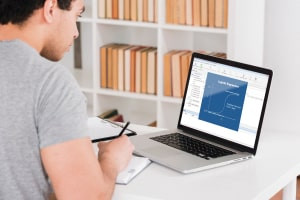Do you want to be an expert in solving business problems using the logistic regression model? Solving complex business problems using different classification techniques will make you a valuable asset in any organization. This course will help you gain insight into the three main classification techniques (logistic regression, linear discriminant analysis and k-nearest neighbors) used to predict a qualitative categorical type of response, which offer fairly accurate predictions. You will discover that there are two types of business questions you need to ask to build the logistic regression model. This course will also help you to predict whether a particular outcome will be realized within a specific time frame. Imagine not needing to worry about the effect of individual variables on the output. You will learn how to predict the value of a response variable. In this process, you will learn to accurately estimate the effect of each predictor variable on the response variable.
You will be introduced to machine learning which refers to programming a computer to maximize or minimize a particular performance criterion based on past data. Then, you will find out that linear regression cannot be used for classification if the response variable contains more than two levels, which is why the logistic regression technique is more appropriate. This technique uses the sigmoid function to limit the output range. This ensures that the output of that particular function can capture the range of probabilities compared to the linear regression model. Discover that the reasons for estimating the relationship between dependent and independent variables are prediction and inference. The prediction reason is focused on the value of Y and not its relationship with other variables. The inference reason seeks to establish how the output variable differs with a change in each predictor variable.
Next, you will learn that categorical variables cannot assume a numerical value but can be classified into two or more non-numeric categories. In contrast, continuous variables can assume any numerical value over a specific interval or intervals. The course will discuss the basics of statistics and RStudio. Gain insight into the classification of statistical tools into descriptive and inferential categories. Descriptive statistics consists of methods for organizing, displaying and describing data through tables, graphs and summary measures. Inferential statistics consists of methods that use sample results to help make decisions or predictions about a population. Finally, you will learn about creating bar plots and histograms in R, plotting a decision tree, missing value imputation, results of simple logistic regression models and interpreting the results of classification models. This course will be of interest to data scientists, executives or students interested in learning about logistic regression. Why wait? Start this course today and become a logistic regression expert.
What You Will Learn In This Free Course
View All Learning Outcomes View Less All Alison courses are free to enrol, study, and complete. To successfully complete this Certificate course and become an Alison Graduate, you need to achieve 80% or higher in each course assessment.
Once you have completed this Certificate course, you have the option to acquire an official Certificate, which is a great way to share your achievement with the world.
Your Alison certificate is:
- Ideal for sharing with potential employers.
- Great for your CV, professional social media profiles, and job applications.
- An indication of your commitment to continuously learn, upskill, and achieve high results.
- An incentive for you to continue empowering yourself through lifelong learning.
Alison offers 2 types of Certificate for completed Certificate courses:
- Digital Certificate: a downloadable Certificate in PDF format immediately available to you when you complete your purchase.
- Physical Certificate: a physical version of your officially branded and security-marked Certificate
All Certificate are available to purchase through the Alison Shop. For more information on purchasing Alison Certificate, please visit our FAQs. If you decide not to purchase your Alison Certificate, you can still demonstrate your achievement by sharing your Learner Record or Learner Achievement Verification, both of which are accessible from your Account Settings.











 Avg. Hours
Avg. Hours  Contains Video
Contains Video  CPD Accredited
CPD Accredited 
 Total XP:
Total XP: 
 Knowledge & Skills You Will Learn
Knowledge & Skills You Will Learn 







